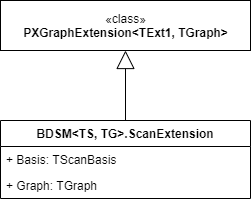Extension of Scan Components: Scan Extensions
Because all scan components have to be sealed classes, they cannot
have virtual methods and thus cannot be customized through class
inheritance. Components use method interceptors for customizations instead. A
component can provide its own ScanExtension class where all
virtual methods are placed.
Scan Extension
The ScanExtension classes are PXGraphExtension
descendants, which can simplify the creation of customizable logic that should be
used in the scope of barcode processing. For example, if a
ScanCommand<TScanBasis> descendant must have complex logic
that should be split into multiple methods, you should create a
ScanExtension descendant that holds all these methods. This
extension can be placed inside the ScanCommand<TScanBasis>
descendant so that its customizable logic is not mixed with the logic of other
components.
The ScanExtension descendant can be customized as any other PXGraphExtension can via PXOverrideAttribute. Any component can access the extension by using the Basis.Get<TScanExtension>() method, which is a shortcut for the Basis.Graph.FindImplementation<TScanExtension>() call.
PXGraphExtension<> class descendant instead of
ScanExtension. However, in this case, the definition of the
extension lacks the Basis property that is used by all scan
components. You need to define this property manually, as shown in the following
code.public class BoycottAntarcticaItems : PXGraphExtension<ReceivePutAway,
ReceivePutAway.Host>
{
public ReceivePutAway Basis => Base1;
}The classes related to scan extensions are shown in the following diagram.

Example of the ScanExtension Approach
public class MyBarcodeExt : BarcodeDrivenStateMachine<MyBarcodeExt, Host>
{
public class Host : TargetGraph { }
// All overridable logic is moved to the Logic class
public sealed class MyCommand : ScanCommand
{
protected override bool Process()
{
Basis.Get<Logic>().Foo();
return true;
}
public class Logic : ScanExtension
{
public virtual void Foo()
{
int bar = Bar("madskillz");
Basis.DoBar(bar);
}
public virtual int Bar(string input)
{
return 7;
}
}
}
}// Overrides MyBarcodeExt.MyCommand.Logic
public class SomeCustomization : PXGraphExtension<
MyBarcodeExt.MyCommand.Logic, // the logic you want to customize
MyBarcodeExt, // optional, is useful if Basis is needed to be used in scope of the customization
MyBarcodeExt.Host // an actual graph
>
{
public MyBarcodeExt Basis => Base1;
// Overrides MyBarcodeExt.MyCommand.Logic.Bar(string)
[PXOverride]
public virtual int Bar(string input, Func<string, int> base_Bar)
{
return base_Bar(input) + 42;
}
}ScanExtension<TScanExtension> Class
The ScanExtension<TScanExtension> class is a
ScanExtension component that is parameterized with another
ScanExtension component type. This class is useful if you
want to customize a ScanExtension component.
INScanCount.CountMode.ConfirmState.Logic class in the following
ways:- By using the PXGraphExtension<>
class
public class AlterCountModeConfirmStateLogic : PXGraphExtension<INScanCount.CountMode.ConfirmState.Logic, INScanCount, INScanCount.Host> { // some logic } - By using the ScanExtension<>
class
public class AlterCountModeConfirmStateLogic : INScanCount.ScanExtension<INScanCount.CountMode.ConfirmState.Logic>> { // some logic }
Although you can use the way you prefer, we recommend that you use the second one.
